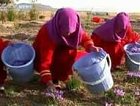| Videos | ? Latest |
|
? Feature | ? Sports | ? Your Videos |
Afghanistan pushes saffron farming

Farmers in the Afghan province of Herat are being encouraged to grow saffron as an alternative to growing opium, which has fueled the insurgency.
The switch is proving beneficial to farmers and the government, who's looking to quell a rising Taliban, and provide a decent living to those trying to scratch out a living.
Impoverished farmers are looking for a new source of income.
In Afghanistan's western Herat province, female workers in red uniforms and purple head scarves strike a contrast against the arid landscape, as they crouch near the ground to gather the dried stigmas that produce saffron.
The women work for Afghan Saffron, the country's biggest investor in the lucrative spice. The company has provided hundreds of jobs for female workers, where many other enterprises have not allowed them to work.
Zahra Haidari, Local Worker, Local Worker, said, "I am happy to work here. I'm old but I can work here. My husband doesn't have a job. I don't have any other person to provide for my family. I am working here to support my family."
Farmers started the practice four years ago. Now more than a thousand farmers in western Afghanistan are producing the valuable bitter spice.
The rise in production has come as the government and international agencies campaigned to encourage farmers to abandon poppy crops. The efforts have also included eradicating poppy fields and prosecuting traffickers.
Ghaffar Hamidzay, Saffron Industry President, said, "Saffron is a very potent crop or a substitute crop for the plantation of poppy in Afghanistan, because it is more valuable and it has more value in price."
But saffron and other substitutes, such as fish farms and wheat, have a long way to go towards replacing opium poppies as an alternative source of income for poor farmers.
 0
0 






